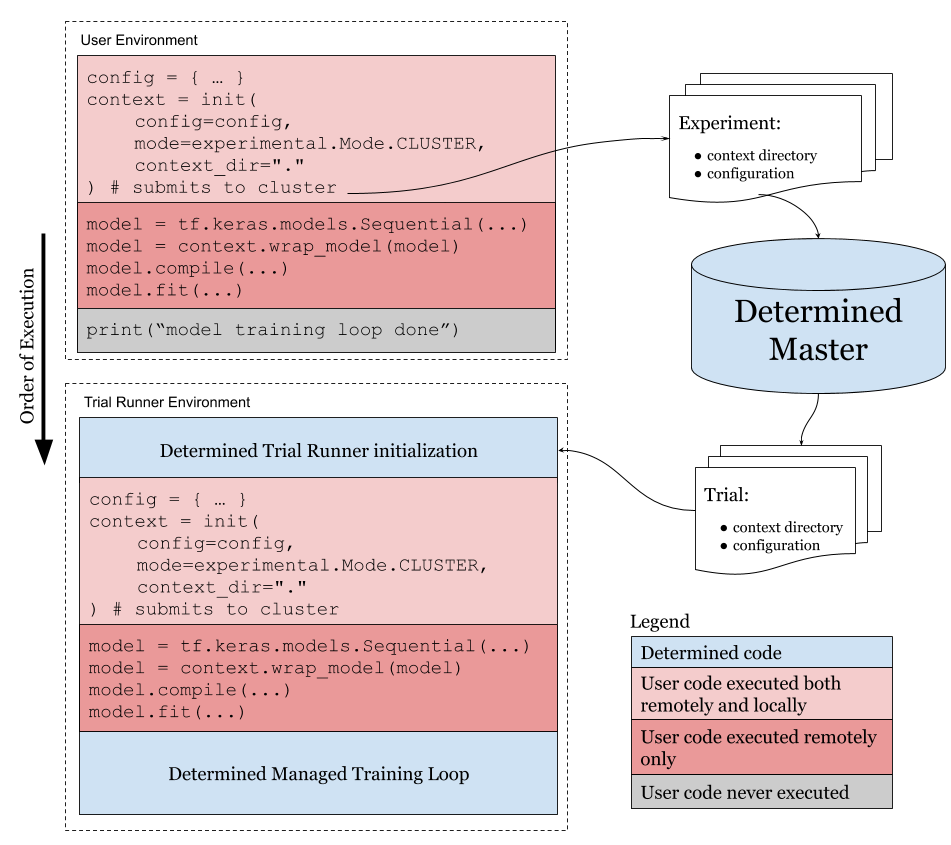Native API (experimental)¶
The Native API allows developers to seamlessly move between training in a local
development environment and training at cluster-scale on a Determined cluster.
It also provides an interface to train tf.keras and tf.estimator models
using idiomatic framework patterns, reducing (or eliminating) the effort to
port model code for use with Determined.
In this guide, we’ll cover what happens under the hood when a user submits an experiment to Determined using the Native API. This topic guide is meant as deep-dive for advanced users – for a tutorial on getting started with the Native API, see Native API Tutorial (Experimental).
Life of a Native API Experiment¶

The diagram above demonstrates the flow of execution when an experiment is
created in determined.experimental.Mode.CLUSTER mode.
The Python script will first be executed by us in the User environment, such
as a Python virtualenv or a Jupyter notebook where the determined Python
package is installed. When the code is executed, init() will create an
experiment by submitting the contents of the context directory and the
experiment configuration in a network request to
the Determined master. Note that any code that comes after the init() call
(typically involving defining the model and training loop) is not executed in
the User environment. In the case of tf.keras, building and compiling the
model is only done on the Determined cluster.
Once the Determined master has initialized a Trial Runner environment, the
user script is re-executed from the beginning using runpy.run_path. In the trial
runner environment, init will return a determined.NativeContext
object that holds information specific to that trial (e.g. hyperparameter
choices) and continue executing. Once the script hits the training loop
function (in this case, tf.keras.Models.fit), Determined will launch into
the managed training loop.
Warning
Any user code that occurs after the training loop has started will never be executed!
High-Level Training Loop Support¶
In order to execute a custom Python script, Determined requires that the user script contains a high-level training loop that it can intercept. Currently, the following training loop functions are supported:
If you are a PyTorch user, there is no standardized high-level training loop to hook into. However, it is still possible to submit experiments from Python by using the Integration with the Trial API.
Integration with the Trial API¶
The Native API can also be used to submit experiments using the
determined.pytorch.PyTorchTrial, determined.keras.TFKerasTrial, or determined.estimator.EstimatorTrial APIs. To
do so, write a script that passes our Trial class definition and
configuration to determined.experimental.create() and execute it in
determined.experimental.Mode.CLUSTER
mode.
determined.experimental.create() replaces init() in the lifecycle
diagram above. Similar to init(), create() will stop execution in the
User environment to submit the experiment via a network request to the
Determined master. However, create() will not return a context object,
because it encapsulates all the necessary information for the Determined
training loop. Python code that comes after create() will neither be
executed in the User environment nor in the Trial Runner environment.
